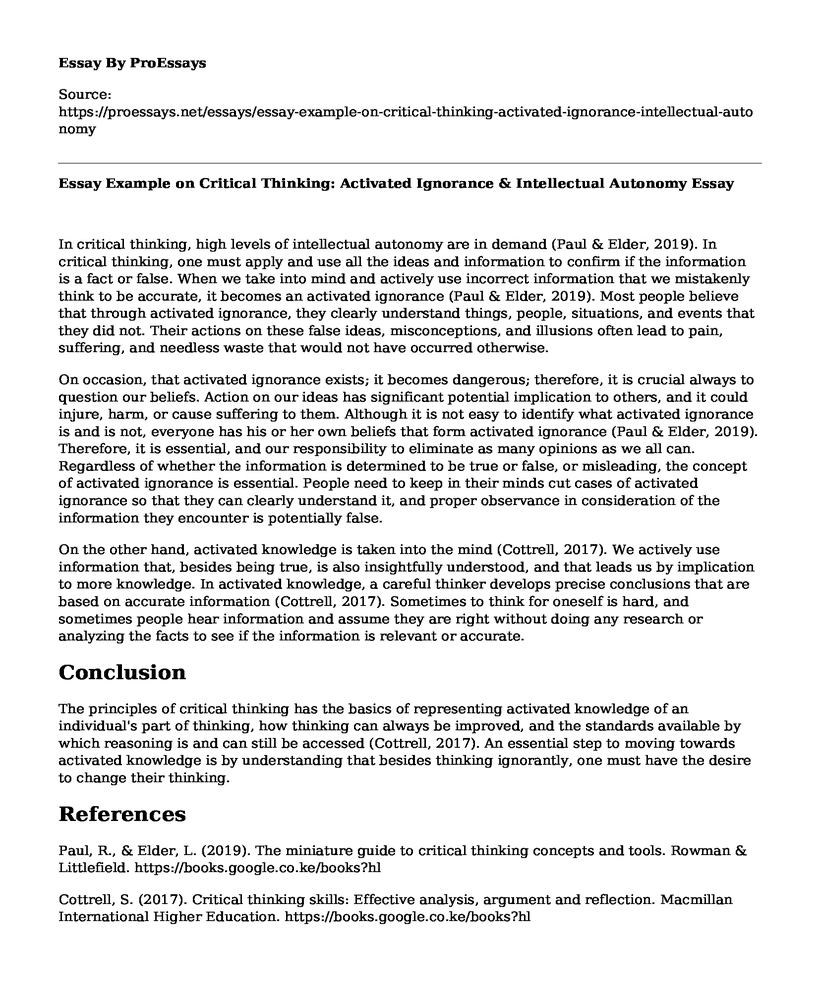In critical thinking, high levels of intellectual autonomy are in demand (Paul & Elder, 2019). In critical thinking, one must apply and use all the ideas and information to confirm if the information is a fact or false. When we take into mind and actively use incorrect information that we mistakenly think to be accurate, it becomes an activated ignorance (Paul & Elder, 2019). Most people believe that through activated ignorance, they clearly understand things, people, situations, and events that they did not. Their actions on these false ideas, misconceptions, and illusions often lead to pain, suffering, and needless waste that would not have occurred otherwise.
On occasion, that activated ignorance exists; it becomes dangerous; therefore, it is crucial always to question our beliefs. Action on our ideas has significant potential implication to others, and it could injure, harm, or cause suffering to them. Although it is not easy to identify what activated ignorance is and is not, everyone has his or her own beliefs that form activated ignorance (Paul & Elder, 2019). Therefore, it is essential, and our responsibility to eliminate as many opinions as we all can. Regardless of whether the information is determined to be true or false, or misleading, the concept of activated ignorance is essential. People need to keep in their minds cut cases of activated ignorance so that they can clearly understand it, and proper observance in consideration of the information they encounter is potentially false.
On the other hand, activated knowledge is taken into the mind (Cottrell, 2017). We actively use information that, besides being true, is also insightfully understood, and that leads us by implication to more knowledge. In activated knowledge, a careful thinker develops precise conclusions that are based on accurate information (Cottrell, 2017). Sometimes to think for oneself is hard, and sometimes people hear information and assume they are right without doing any research or analyzing the facts to see if the information is relevant or accurate.
Conclusion
The principles of critical thinking has the basics of representing activated knowledge of an individual's part of thinking, how thinking can always be improved, and the standards available by which reasoning is and can still be accessed (Cottrell, 2017). An essential step to moving towards activated knowledge is by understanding that besides thinking ignorantly, one must have the desire to change their thinking.
References
Paul, R., & Elder, L. (2019). The miniature guide to critical thinking concepts and tools. Rowman & Littlefield. https://books.google.co.ke/books?hl
Cottrell, S. (2017). Critical thinking skills: Effective analysis, argument and reflection. Macmillan International Higher Education. https://books.google.co.ke/books?hl
Cite this page
Essay Example on Critical Thinking: Activated Ignorance & Intellectual Autonomy. (2023, Aug 29). Retrieved from https://proessays.net/essays/essay-example-on-critical-thinking-activated-ignorance-intellectual-autonomy
If you are the original author of this essay and no longer wish to have it published on the ProEssays website, please click below to request its removal:
- Applying For Scholarship
- Be Aware About Anti-Bias for Preschool
- Essay on Brown and Levinson's Framework: Advancing Human Speech & Communication
- Paper Example on Student Perception of Revenge, Family, Luck and Learning
- Essay Example on Gaining English Skills and Knowledge: From Interest to Success
- Early Brain Development: Utilizing Games, Music, and Colors to Enhance Learning - Essay Sample
- Unveiling Cognitive Bias in Forensic Science: A Critical Examination and Strategies for Improvement - Free Paper







